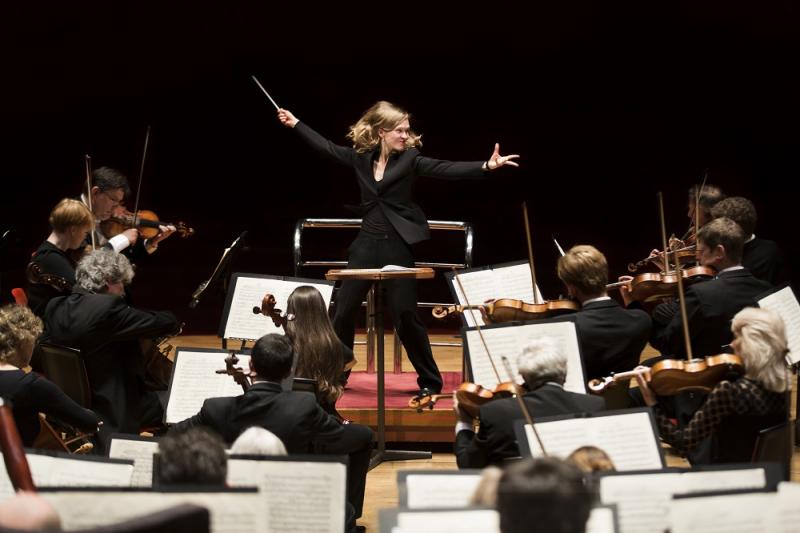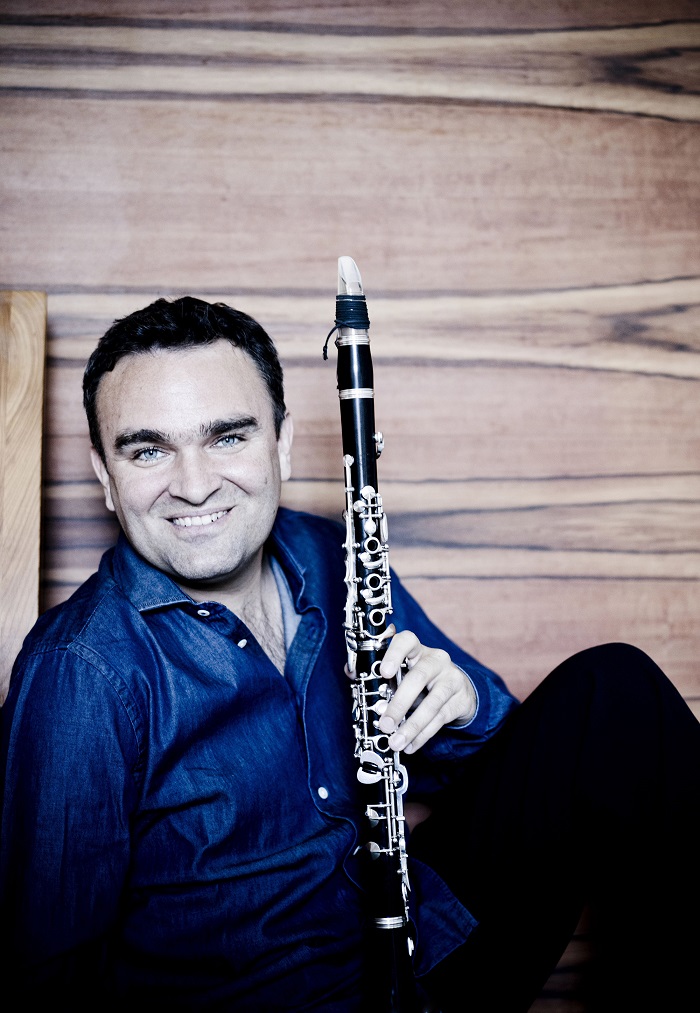Widmann, CBSO, Gražinytė-Tyla, Symphony Hall Birmingham review - when Mirga met Jörg | reviews, news & interviews
Widmann, CBSO, Gražinytė-Tyla, Symphony Hall Birmingham review - when Mirga met Jörg
Widmann, CBSO, Gražinytė-Tyla, Symphony Hall Birmingham review - when Mirga met Jörg
Echoes of early Rattle, as Brahms and Mozart square up against a modern maverick

Apparently it was Mirga Gražinytė-Tyla’s idea to invite Jörg Widmann to be the City of Birmingham Symphony Orchestra’s Artist in Residence this season – indeed, according to backstage rumours she made the phone call herself.
Gražinytė-Tyla hit us with it good and strong, with a performance – billed as the “English premiere”, the orchestra of Welsh National Opera having played it in Cardiff last year – of Widmann’s sprawling, shamelessly lavish Babylon Suite. Ostensibly a medley of orchestral highlights from Widmann’s 2012 opera Babylon, the scale of this crazily eclectic 40-minute single movement is reminiscent of the symphonies that Hindemith derived from his operas. But the resemblance ends there. Widmann’s supersized orchestra features two harps, accordion, a wall of tuned percussion and apparently (though I couldn’t hear them) a pair of ocarinas.
 As for his musical language; well, it’s almost easier to list the styles that he doesn’t reference. Widmann cheerfully plunders the wreckage of two centuries of musical civilisation, and Max Steiner, John Adams and Miles Davis are as central to his world-view as the more predictable suspects, Mahler, Strauss, Shostakovich and the Second Viennese School. Yearning romantic melodies rise hazily in the distance; a solo violin fiddles manically over a folk tune. Salome exits pursued by a Tom and Jerry scherzo, muted trumpets and high clarinets squawk derisively at a strutting Prussian march, and rasping gongs tear ominously through the texture of ever grander Hollywood climaxes.
As for his musical language; well, it’s almost easier to list the styles that he doesn’t reference. Widmann cheerfully plunders the wreckage of two centuries of musical civilisation, and Max Steiner, John Adams and Miles Davis are as central to his world-view as the more predictable suspects, Mahler, Strauss, Shostakovich and the Second Viennese School. Yearning romantic melodies rise hazily in the distance; a solo violin fiddles manically over a folk tune. Salome exits pursued by a Tom and Jerry scherzo, muted trumpets and high clarinets squawk derisively at a strutting Prussian march, and rasping gongs tear ominously through the texture of ever grander Hollywood climaxes.
In short (which it certainly isn’t), the Babylon Suite is a glorious Technicolor mess, ambitiously conceived and dazzlingly orchestrated. Gražinytė-Tyla and her orchestra played the socks off it, drawing enthusiastic applause for a work which, performed with even slightly less conviction, could easily have outstayed its welcome. Half the battle, of course, is that the audience was willing to be convinced – a secret that the young Simon Rattle discovered in Birmingham three decades ago when he championed similarly improbable modernist one-offs like Robin Holloway’s Clarissa Symphony and Nicholas Maw’s Odyssey. Long-serving Birmingham audience members are already speaking of Gražinytė-Tyla in the same terms: moments like this show you why.
Still, it probably helped that we’d just seen Widmann (pictured above right) as soloist in Mozart’s Clarinet Concerto (the notion of starting a concert with a concerto feels perfectly natural with Gražinytė-Tyla). He’s a smiling, buoyant presence on stage, responding to each section of the orchestra in turn, locking eyes as well as semiquavers with the strings, and moulding melodies and passagework alike with a lithe, transparent tone. This was one of the least indulgent Mozart clarinet concertos I’ve heard, and its special grace lay in the unforced way Widmann, Gražinytė-Tyla and the orchestra played off each other. She has a wonderful way of making classical rhythms dance and whole phrases sing: ornaments, with Gražinytė-Tyla, are never merely decorations. The result was fresh, translucent, and utterly unaffected.
That same instinct for classicism defined her reading of Brahms’s First Symphony, after the interval. Gražinytė-Tyla appears to see the symphony as a single huge arc, and the opening bars had an irresistible forward momentum. The first movement swept by in taut, streamlined paragraphs, with Gražinytė-Tyla making full use of the rich string sound bequeathed to her by Sakari Oramo and Andris Nelsons to shape an argument that was entirely her own. That meant an Andante that was a muscular continuation of the first movement’s struggle; and a third movement that, with ominous trumpets and steadily rising tension, served as extended preparation for the finale. There was no letting up here, either: Elspeth Dutch (horn) and Marie-Christine Zupancic (flute) were powerfully assertive in their big solos. With the second violins sitting on the outside of the orchestra, the great theme of the Allegro sounded duskier than usual, and even as Gražinytė-Tyla accelerated into the coda, there was no sense of an easy resolution: the stakes remained as high as anywhere in the drama.
Such a single-minded reading won’t have been to all tastes, and Gražinytė-Tyla might well approach Brahms differently in five or 10 years’ time. For now, though, her long-range vision and formal command are beyond question, and so too is the way in which she takes both audience and orchestra along with her. The silence between movements practically crackled. And that ability to create a collective enthusiasm – a shared sense of adventure – is what makes Gražinytė-Tyla’s concerts in Birmingham some of the most life-affirming experiences on the UK concert scene right now. You never quite know what she’ll spring on you, but every single concert is an occasion – and one that you don’t want to miss.
rating
Share this article
Add comment
The future of Arts Journalism
You can stop theartsdesk.com closing!
We urgently need financing to survive. Our fundraising drive has thus far raised £49,000 but we need to reach £100,000 or we will be forced to close. Please contribute here: https://gofund.me/c3f6033d
And if you can forward this information to anyone who might assist, we’d be grateful.

Subscribe to theartsdesk.com
Thank you for continuing to read our work on theartsdesk.com. For unlimited access to every article in its entirety, including our archive of more than 15,000 pieces, we're asking for £5 per month or £40 per year. We feel it's a very good deal, and hope you do too.
To take a subscription now simply click here.
And if you're looking for that extra gift for a friend or family member, why not treat them to a theartsdesk.com gift subscription?
more Classical music
 From Historical to Hip-Hop, Classically Black Music Festival, Kings Place review - a cluster of impressive stars for the future
From quasi-Mozartian elegance to the gritty humour of a kitchen inspection
From Historical to Hip-Hop, Classically Black Music Festival, Kings Place review - a cluster of impressive stars for the future
From quasi-Mozartian elegance to the gritty humour of a kitchen inspection
 Shibe, LSO, Adès, Barbican review - gaudy and glorious new music alongside serene Sibelius
Adès’s passion makes persuasive case for the music he loves, both new and old
Shibe, LSO, Adès, Barbican review - gaudy and glorious new music alongside serene Sibelius
Adès’s passion makes persuasive case for the music he loves, both new and old
 Anja Mittermüller, Richard Fu, Wigmore Hall review - a glorious hall debut
The Austrian mezzo shines - at the age of 22
Anja Mittermüller, Richard Fu, Wigmore Hall review - a glorious hall debut
The Austrian mezzo shines - at the age of 22
 First Person: clarinettist Oliver Pashley on the new horizons of The Hermes Experiment's latest album
Compositions by members of this unusual quartet feature for the first time
First Person: clarinettist Oliver Pashley on the new horizons of The Hermes Experiment's latest album
Compositions by members of this unusual quartet feature for the first time
 Gesualdo Passione, Les Arts Florissants, Amala Dior Company, Barbican review - inspired collaboration excavates the music's humanity
At times it was like watching an anarchic religious procession
Gesualdo Passione, Les Arts Florissants, Amala Dior Company, Barbican review - inspired collaboration excavates the music's humanity
At times it was like watching an anarchic religious procession
 Classical CDs: Camels, concrete and cabaret
An influential American composer's 90th birthday box, plus British piano concertos and a father-and-son duo
Classical CDs: Camels, concrete and cabaret
An influential American composer's 90th birthday box, plus British piano concertos and a father-and-son duo
 Cockerham, Manchester Camerata, Sheen, Martin Harris Centre, Manchester review - re-enacting the dawn of modernism
Two UK premieres added to three miniatures from a seminal event of January 1914
Cockerham, Manchester Camerata, Sheen, Martin Harris Centre, Manchester review - re-enacting the dawn of modernism
Two UK premieres added to three miniatures from a seminal event of January 1914
 Kempf, Brno Philharmonic, Davies, Bridgewater Hall, Manchester review - European tradition meets American jazz
Bouncing Czechs enjoy their Gershwin and Brubeck alongside Janáček and Dvořák
Kempf, Brno Philharmonic, Davies, Bridgewater Hall, Manchester review - European tradition meets American jazz
Bouncing Czechs enjoy their Gershwin and Brubeck alongside Janáček and Dvořák
 Solomon, OAE, Butt, QEH review - daft Biblical whitewashing with great choruses
Even a top soprano and mezzo can’t make this Handel paean wholly convincing
Solomon, OAE, Butt, QEH review - daft Biblical whitewashing with great choruses
Even a top soprano and mezzo can’t make this Handel paean wholly convincing
 Two-Piano Gala, Kings Place review - shining constellations
London Piano Festival curators and illustrious friends entertain and enlighten
Two-Piano Gala, Kings Place review - shining constellations
London Piano Festival curators and illustrious friends entertain and enlighten
 Echo Vocal Ensemble, Latto, Union Chapel review - eclectic choral programme garlanded with dance
Beautiful singing at the heart of an imaginative and stylistically varied concert
Echo Vocal Ensemble, Latto, Union Chapel review - eclectic choral programme garlanded with dance
Beautiful singing at the heart of an imaginative and stylistically varied concert
 Scott, Irish Baroque Orchestra, Whelan, RIAM, Dublin review - towards a Mozart masterpiece
Characteristic joy and enlightenment from this team, but a valveless horn brings problems
Scott, Irish Baroque Orchestra, Whelan, RIAM, Dublin review - towards a Mozart masterpiece
Characteristic joy and enlightenment from this team, but a valveless horn brings problems

Comments
why was the audience led to
Does anyone remember when a